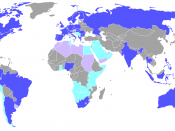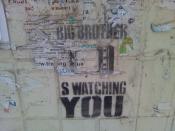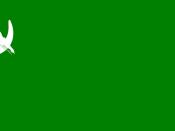Nineteen Eighty-Four/Animal Farm Comparison EssayIn both Nineteen Eighty-Four and Animal Farm, by George Orwell, we see the story of how a society is formed for the betterment of all, but is soon turned to evil. In the two tales, both governments in the two tales were originally created to improve the common workerÃÂs lives, but are soon waylaid by the prospect of unlimited power that is associated with a dictatorship role. We can see, through different examples, how power corrupts and absolute power corrupts absolutely. The few take control, seeing themselves as fit to lead the many, but become tempted by the vast control that they are able to achieve . There are three stages to this corruption, each with their own unique events that play out. We can see how power corrupts and absolute power corrupts absolutely, meaning even those with the best intentions can fall away from their original goals.
In the beginning of the novels, we see how the governments came into power, replacing the old regime that had run its course. In Animal Farm, the animals rebel against Jones because they are fed up with how terribly he treats them and he takes everything they produce away from them to be sold for personal profit. The animals throw off the chains of oppression, pledging to create a better society where all animals are equal and everyone would be able to live in harmony with each other. The animals worked harder than ever before and are soon able to set up a society that would benefit everyone: ÃÂ...everyone worked according to his capacity....Nobody stole, nobody grumbled over his rations, the quarrelling and biting and jealousy which had been normal features of life in the old days had almost disappeared. Nobody shirkedÃÂ (Animal Farm 18). Two animals emerge as leaders, Napoleon and Snowball, and the duo soon begin to build a utopian society for the other animals, all with good intentions in the beginning. All animals are given rations based on their needs, allowing for no one to go without food. Therefore in Animal Farm, Detzler 2we see how the animal rebellion began to change the oppressive way of life that they have always lived under, forming a better way of living for all animals.
In Nineteen Eighty-Four, we learn that the Party was formed to destroy capitalism and the wickedness associated with it. Big Brother and Emmanuel Goldstein wanted to stop the land and factory owners from taking advantage of the common people, all while hoarding the vast majority of the profits for themselves:'...The history books say that life before the Revolution was completely different from what it is now. There was the most terrible oppression, injustice, poverty worse than anything we can imagine. Here in London, the great mass of the people never had enough to eat from birth to death. Half of them hadn't even boots on their feet. They worked twelve hours a day, they left school at nine, they slept ten in a room. And at the same time there were a very few people, only a few thousands -- the capitalists, they were called -- who were rich and powerful. They owned everything that there was to own...ÃÂ(Nineteen Eighty-Four 93).
The Party was formed to stop the spread of private ownership and the lure of the control associated with owning much of the land and businesses, which would allow private citizens to take advantage of other people for personal gain. The capitalists owned everything and rented items out to the common people at rates the could not afford. The land/factory owners would then supply a line of credit to the people, which would be subject to a extremely high interest rate. This would then put the people into such large debt that they would never be able to pay back the owners, effectively becoming their slaves. Therefore, we can easily see how the government of Oceania was formed to destroy capitalism and install socialism, a way of life that would benefit all of its citizens.
Detzler 3The next stage of the total corruption would be the creating of a rift in the new government through the corruption of its leaders. In Animal Farm, Snowball and Napoleon began to constantly argue over what should be done to make the farm more efficient. Snowball strived to help others, but Napoleon disagreed simply because the ideas brought forward were not originally thought of by Napoleon himself. Snowball wanted the animals to build a windmill to grind grain and provide electricity for lights, heaters, and other farm equipment. Napoleon, on the other hand, wanted the animals to focus their energy on planting the crops. Likewise, we can see the beginnings of NapoleonÃÂs changes when he steals the milk for his personal consumption and when he whisks the puppies away from their mothers to ÃÂeducate themÃÂ, creating his own personal ÃÂpoliceÃÂ force later on in the novel. Eventually, Napoleon seized power for himself, exiling Snowball from the farm forever:... Napoleon stood up and, casting a peculiar sidelong look at Snowball, uttered a high pitched whimper of a kinds no one had ever heard him utter before.
At this there was a terrible baying sound outside, and nine enormous dogs... dashed straight for Snowball, who only sprang from his place just in time to escape their snapping jaws. In a moment he was out the door and they were after him.... Snowball was racing across the long pasture that led to the road. He was running [and] [s]uddenly he slipped and it seemed certain that they had him. Then he was up again, running faster than ever, then the dogs were gaining on him again.... Then he put on an extra spurt, and with a few inches to spare, slipped through a hole in the hedge and was seen no more (Animal Farm 36).
Napoleon was tempted by the prospect of total control over the other animals and used fear through his police force to abolish the utopian ideals from the government, setting up a Detzler 4totalitarian system of command. Hence, we see how Napoleon is drawn to the limitless power that is within his reach and takes hold of it, ousting Snowball and establishing himself as sole ruler of Animal Farm. Napoleon has therefore became an absolute dictator, a ruler who will maintain his power with an iron fist and the use of a vicious ÃÂpoliceÃÂ force to back him and protect him against any enemies.
In Nineteen Eighty-Four, we also see a division among the leaders of the original rebellion. Big Brother and Goldstein were originally leaders of the rebellion and led the Party together. They controlled the Party, eliminating capitalism and distributing wealth equally among the people, but the two began to disagree. Goldstein was then exiled from Oceania, with Big Brother citing that he (Goldstein) had given secrets to the enemy: ÃÂGoldstein was the renegade and backslider who once, long ago (how long ago, nobody quite remembered), had been one of the leading figures of the Party, almost on a level with Big Brother himself, and then had engaged in counter-revolutionary activities, had been condemned to death, and had mysteriously escaped and disappeared.ÃÂ (Nineteen Eighty-Four 13). Big Brother then took complete control, completing the second stage of corruption just like Napoleon did. In Nineteen Eighty-Four, we do not know if Big Brother is a real person, but we can say that he represents the few people at the top of the government that took control alongside Goldstein. They most likely ruled Oceania with an oligarchical system, but Goldstein began to drift away from the group. He was not conforming to what they wanted, an so he was then exiled and the others took control. The entity of Big Brother was most likely created as a way for the common people to better associate themselves with a perfect leader that they can all relate to, but Big Brother, as a representative of the few power hungry members, became tempted at the power that was within ÃÂhisÃÂ reach. In conclusion, Big Brother also became tempted by the power available to him and Detzler 5seized it for himself, exiling Goldstein, a former supporter, from Oceania. This completed the second stage of absolute corruption, just like Napoleon did, with Big Brother becoming sole ruler and use intense levels of fear to ensure his continuing reign.
The final stage of corruption would be the degradation of the society back to the original quality of life. In Animal Farm, we soon see how poorly the animals are treated. They are overworked, underfed, and intimidated by the pigs. The pigs raise themselves above the other animals through the use of fear to control the animals. The police force (ie the guard dogs) is used to patrol the farm and to kill any animal that opposes the pigs. Any animal that shows some level of intelligence that might threaten the absolute power of Napoleon is killed off in front of the other animals. This is an example of what can happen if they pose a threat to Napoleon: ÃÂAnd so the tale of confessions and executions went on, until there was a pile of corpses lying before NapoleonÃÂs feet and the air was heavy with the smell of blood, which had been unknown there since the expulsion of Jones.ÃÂ (Animal Farm 57). The animals admit, through intimidation by Napoleon and his dogs, to committing crimes against Napoleon and the farm. They are slain to make examples for what will happen to any other animal that goes against Napoleon. Eventually, the pigs reduce themselves back down to the level of the humans, with the animals unable to tell the pigs and the humans apart during a game of cards.
In Nineteen Eighty-Four, we can see how the society of Oceania has failed in its original mission to destroy private ownership and to distribute the wealth equally among all people. The proles are treated like animals and are not educated so they can be better controlled through fear of an unknown outside enemy that is always provided by the Inner Party. The Outer Party is treated slightly better, with an education system in place to help them with their jobs that serve the Party. They also live in fear, with every person being constantly monitored by cameras and Detzler 6microphones, waiting for someone to commit some deviant act against the party. The Outer Party members live in poor conditions and receive terrible food rations (such as Victory Gin, Victory cigarettes, saccharine, etc.). The proles and the Outer Party members are treated this way to create a dependancy on the Inner Party for food and other items in order to stay alive. The people live with the fear that if they do not do what the Inner Party wants, they will have the food rations stopped and the Thought Police will come for them in the night to have them vaporized:Thoughtcrime was not a thing that could be concealed forever. You might dodge successfully for a while, even for years, but sooner or later they were bound to get you.
It was always at night-the arrests invariably happened at night. The sudden jerk out of sleep, the rough hand shaking your shoulder, the lights glaring in your eyes, the ring of hard faces round the bed. In the vast majority of cases there was no trial, no report of arrest. People simply disappeared, always during the night. Your name was removed from the registers, every record of everything you had ever done was wiped out, your one time existence was denied and then forgotten. You were abolished, annihilated: vaporized was the usual word. (Nineteen Eighty-Four 21)The Inner Party, on the other hand, lives in beautiful homes and receives the best food available. They use their police patrols, both the Secret Police and the Public Police, to frighten all opposition to the Party into submission into their will. We see how the Inner Party has become just like the capitalists: they take advantage of the common people, rewarding them as little as possible for their service to the Party, and the use of a intimidating police force to control the people and to make examples of the ones who go against what is considered the current norm with the Party. Hence, the regime of Oceania has completed the cycle and has become exactly like the former way of life that it initially replaced.
Detzler 7Throughout Animal Farm and Nineteen Eighty-Four, we see the three stages of absolute corruption caused by the power associated with a leadership role. It is a cycle, with the new government initially improving on the mistakes of the past. But they soon forget the lessons of history and reverting back to the state of the original society, with the social conditions sometimes becoming even worse than they used to be. These ÃÂnewÃÂ rulers are completely evil and do not care about the people that are deeply dedicated to them and their cause: ÃÂ They were despotic rulers, determined to maintain their civilization within their grasp. They psychologically brainwashed each of their subjects and compelled them to labor ceaselessly. At the end, devotees such as Boxer and Parson are destroyed simply because they are expendableÃÂ (Danforth par. 6). The animals are worked harder than they were under the control of Jones, and the pigs still take eggs and milk from the others to be sold for profit. Jones did not use dogs to control the animals but now the pigs have established a hierarchal society with the use of a police force to ensure its enduring survival. The Inner Party has become the same as the capitalists, with the few people in control taking extreme advantage of the people for personal gain. The Inner Party uses ultimate terror to control the people, sometimes even firing rockets into its own cities and blaming it on the current enemy of Oceania. This is done to create fear and anger towards either Eastasia or Eurasia, and to cause the people to look to the Inner Party for a leader to help them in their time of need. Even though some people seem to be good leaders in the beginning, they too can become corrupted by the enormous power that is within their reach. Both Snowball and Goldstein would have made better leaders, since they always wanted what was best for the people and did not think of personal gain. These two would have remained objective, but they were driven away by some power hungry former ally. We can see through both the actions of the good and the bad leaders that even though someone may have originally intended too good for the people, some people can be easily swayed from their original missions and become as corrupt as the people that they had replaced in the first rebellion.
Detzler 8 Detzler 9Works CitedDanforth, Phillip. A Comparison of Orwell's Animal Farm and 1984. [Online] Availablehttp://library.thinkquest.org/2847/novels/anmlfmf3.htm, May 19, 2006.
Orwell, George. Animal Farm. Toronto: Penguin Books, 1989.
- - -. Nineteen Eighty-Four. Toronto: Penguin Books, 1990.
Author Unknown. Friedrich Nietzsche Quotes. [Online] Available http://en.thinkexist.com/quotation/in_all_institutions_from_which_the_cold_wind_of/173442.html, May 19,2006.


